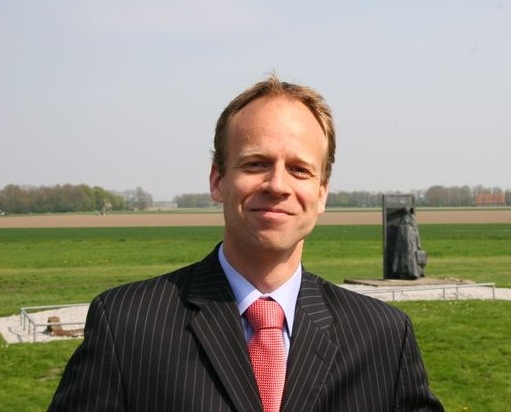Virtual Mentor
Leadership Development through Self Assessments, 360 Feedback and Goal Setting

Self Assessments
The initial phase of the Virtual Mentor program consists of a series of self-assessments, which will give valuable insight into your personality traits and how they influence your current leadership potential.
360 Feedback
The next step in the program is the 360 Virtual Mentor Leadership Questionnaire. You answer the questions for yourself and you invite others to provide the same information about you, so you compare both views.
Goal Setting
In the last step of the program, you will use the feedback and insights from the Self Assessments and the 360 Feedback to set goals for your self to improve your leadership skills, and track your progress.
Learn More
Virtual Mentor is available for organizations and universities. Contact us through LinkedIn to find out more about Virtual Mentor.
Self Assessments
Discover your strengths and weaknesses, your values, your personality traits, and your leadership style through the various Virtual Mentor self- assessments. This initial phase of the Virtual Mentor program helps you discover your current leadership potential in a quantitative way. The resulting insights will serve as a foundation for the 360 feedback and the goal setting activities.
You can complete the self-assessments at your own pace. Answers are saved and once you are finished, you can submit the results and receive a detailed report explaining what your results mean for your leadership development and potential.
Virtual Mentor has the following self-assessments:
- Personal Styles Inventory
- Self Monitoring
- Tolerance of Ambiquity
- Value Importance
- Self Awareness
- Goal Orientation
- Locus of Control
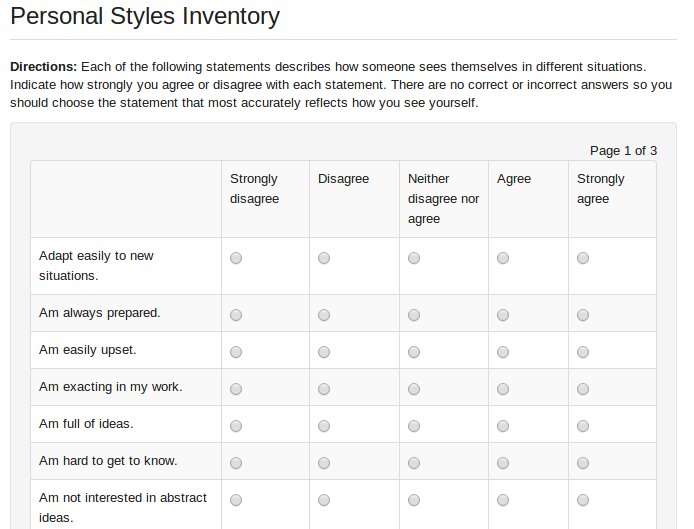
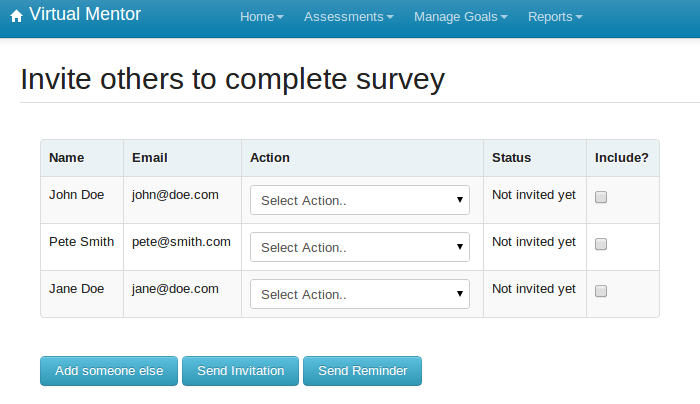
360 Feedback
The central component of the Virtual Mentor program is the 360 feedback leadership questionnaire. You first answer the questions for yourself. Then also invite others (colleagues, peers, supervisors, reports, family and friends) to answer the same questions about you. Answering these questions will take them about 15 to 20 minutes.
The Virtual Mentor system will send emails to your invitees with a direct link to a page where they can give their 360 feedback about you. You will be able to see how many people have given their feedback but you won't know exactly who responded and who hasn't yet. The system allows you to send reminders to those who have not provided feedback yet.
Virtual Mentor guarantees that the feedback you’ll receive is fully anonymous. When people know that their feedback is anonymous, they are far more likely to give you honest feedback. And you need honest feedback in order to know which areas need more attention and which don't.
You get anonymous feedback consolidated into one average score per question. This means you get reliable information about how others see you and you can compare these results with your own assessment.
In addition to the scored questions, your feedback providers can also include more detailed written comments that enrich what and how you learn about your leadership skills.
Not only will you learn more about how you see your own strenghts and development needss, but you will also get valuable insights to where others perceive you differently than you see yourself.
The report will show consolidated results for the following areas:
- Integrity and Commitment
- Collaborative Communication
- Managing Performance
- Conflict Management
- Meeting and Presentation Skills
- Innovative Problem Solving
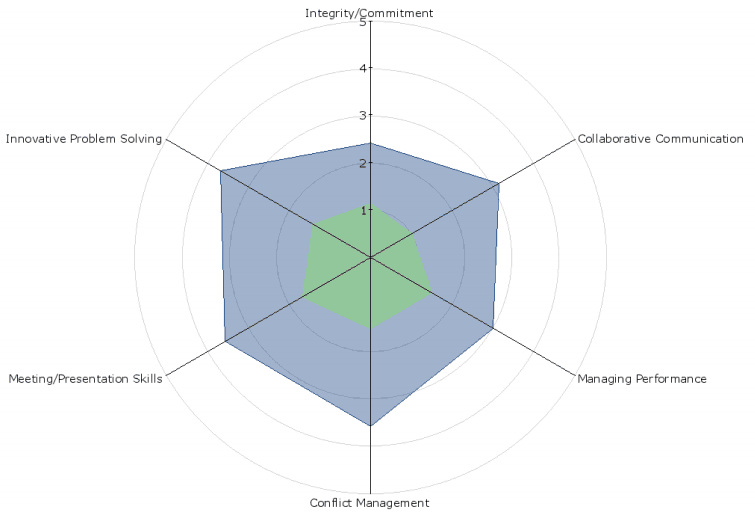

In addition to these high level feedback metrics, your report will also contain feedback at a more detailed level. For each question, you get to see people's consolidated feedback, compared with your own score.
The standard deviation is also shown because it is a good indication of the extent to which your feedback providers are in agreement with each other.
Your score is also compared to the norm, which is the average score of over 2,000 graduate students and working professionals.
Your report will also show you where the biggest gaps are between what people think of you and how you see yourself, and it will show you the areas where you scored highest and where you scored lowest.
Goal Setting
The self-assessments and the 360 feedback give you invaluable insights to your strengths and development opportunities. In order to improve your leadership qualities in areas that are important to you, you will have to set development goals.
The first step in the Goal Setting process is to reflect upon the information from the various Self Assessments and your 360 feedback.
Next Virtual Mentor will help you by providing a structured process for defining your personal vision, choosing skills and goals to develop, and creating a plan to achieve them.
Virtual Mentor also enables you to track your progress towards your goals on a weekly basis. It will even prompt you with email reminders if you find that helpful.
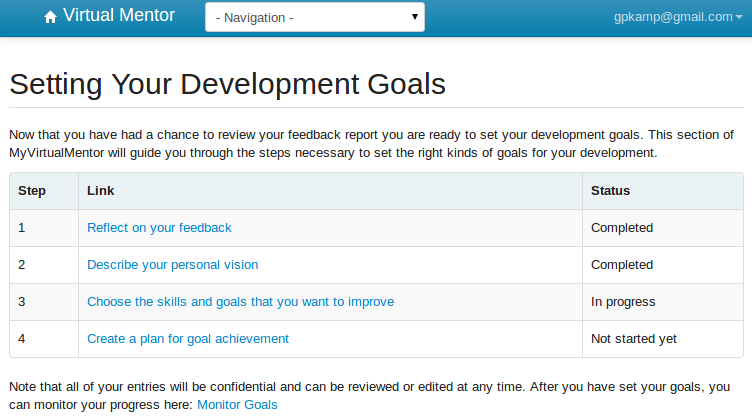
About
Virtual Mentor is developed and supported by:
Dr Pete Dominick
Peter G. Dominick, is an Industry Associate Professor within the W.J. Howe School of Technology. As an educator and consultant, he has created leadership development curricula stressing action learning and personal development planning.
He has published numerous papers on multi-source feedback and other aspects of leadership development. His book chapters include Instilling the Leadership Development Mindset and Forced Choice Ranking: Pros, Cons and Alternatives. He is also co-author of Tools and Tactics of Design (John Wiley & Sons), which focuses on interpersonal and cognitive competencies required to execute the engineering design process.
Pete has designed and delivered leadership development programs for organizations that include the U.S. Department of Defense, ExxonMobil, NASA, BAE, IBM and Pearson-Learning Corporation.
Pete received his Ph.D. in Applied Psychology from Stevens, earned his MA in Organizational Psychology from Columbia University, and completed his undergraduate studies in Industrial and Labor Relations at Cornell University. In addition, Pete has been honored with awards for distinguished university teaching on three separate occasions. The most recent of which was in 2013 when he received the Institute’s Alexander Crombie Humphrey’s Distinguished Teaching Award.

Dr Gerrit Kamp
Gerrit Kamp is a self-employed Software Developer, working on the non-profit Quiet Time. Gerrit worked before as the Director of Engineering and as an Application Engineer at Big Human, where he works on web-application development for various customers. Prior to joining Big Human, Gerrit worked as an engineer at VYou, a video-based social network.
Earlier positions include CTO of ID8 Systems, CEO of Kamp Consulting, Consulting at IBM Global Services, and Engineer / Project Manager at Airborne International.
Gerrit has published in fields related to Innovation Management, Offshore Engineering, and Material Science and is inventor of patents in each of these areas as well.
Gerrit received his Ph.D. in Technology Management from Stevens Institute of Technology, earned his MBA from Webster University, and completed his graduate degree in Aerospace Engineering at Delft University of Technology.
